
Vienna is Different
During decades the tourist propaganda has claimed: "Vienna is Different!", without specifying the way of being different.
Surely one of the reasons is, that essentially it is about the atmosphere, thus having to communicate a feeling - and not statistical facts. Because naturally Vienna is a major city as any other. On the main streets there is a traffic jam at rush hours and the metro is crowded. That is exactly the same in Berlin or in Paris. People hurry as much as in Stockholm or Hamburg and the commerce is as acquisitive as in London.
Still - Vienna is different indeed. It might be difficult, but I shall try to show a couple of things. Vienna is a green city. The very centre, "die Innere Stadt", is more or less surrounded by parks and the alley on the Ringstraße. Schönbrunn, Belvedere, Augarten and last not least the wetlands in the Prater are big green areas - still very much within the city. Finally also the natural environment of the Wienerwald (the Viennese Woods), from the Lainzer Tiergarten in the West, until the Kahlen- and Bisamberg in the North are part of the city area, that measures roughly 20 times 20 kilometres.
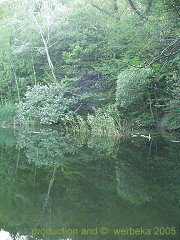 |
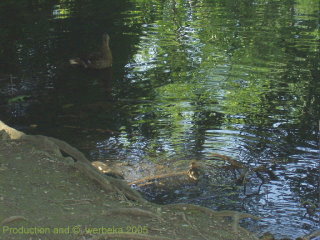 |
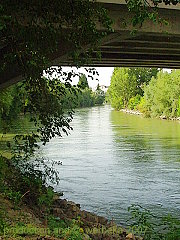 |
| The Silbersee in the Dehnepark |
It couldn't be more impressionistic |
At the Donaukanal - 10 minutes walk away from the very centre |
The inhabitants of Vienna need also some exercise. But you will barely see any Viennese, who, with ski sticks in the hand, runs around in the "Nordic-walking-style". The exercise is only a side-effect - actually the Viennese goes to the Heurigen, which often so practically is situated in the outskirts and a little uphill. So the exercise can be used as a welcome excuse for the visit at the Heurigen. Finally the Heurige actually is something, that makes Vienna different ...
While the Heurige is a tradition, Vienna can be very innovative as well. Tired of the everlasting threat of an overflow of the Danube, in the Seventies it was decided to build a second bed for the river, at the same time creating an island, the Donauinsel. At normal waterlevel the latter serves mainly for recreation and every year at the end of June there is the Donauinselfest, a three day (and night) long open-air-party, searching in vain for the likes of it. About three million(!) people attend here every year. Even concerning that, Vienna is different.
And talking about innovative: Moored to the Donauinsel there is the "Bertha von Suttner", a schoolship. Ah, the reader thinks, a training ship for sailors and other seamen.
 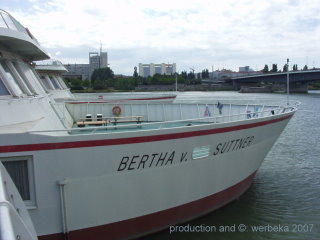 By far off target! The Bertha accomodates a highschool, that is a normal school with a chemistry lab and geography lessons, maths, a room for indoor gymnastics and everything else, that should be part of it. And this is really different, isn't it? Besides the pupils probably can claim seasickness as a reason for being absent ...
By far off target! The Bertha accomodates a highschool, that is a normal school with a chemistry lab and geography lessons, maths, a room for indoor gymnastics and everything else, that should be part of it. And this is really different, isn't it? Besides the pupils probably can claim seasickness as a reason for being absent ...
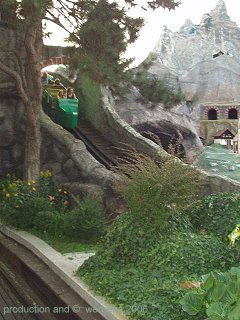 |
From the Donauinsel it isn't very far to the Prater, the only big attraction park, that I know, where you can enter without paying any fee. The Riesenrad, a giant wheel, is also more than a hundred years older than the Millennium-wheel in London. And who needs to go to Disneyland, if you can attend an attraction whenever you feel so inclined and without any waiting line? Neither has McDonalds any chance against the Schweizerhaus, a restaurant, where you are served the best Budweiser beer of the world (except maybe in Budweis itself). Here Vienna definitely is different.
An amazing solution was found for public traffic - that was decided in the Seventies as well - when the tramways and the buses started riding without any conductors. Thus the responsibility was given to the passengers, if they wanted to pay for their transport, or not. But of course there is some random inspection - and if one gets caught, it will get very expensive.
|
 |
On the other hand, most of the passengers have tickets valid for a month or even a year. Most of the others don't want to risk a big fine and buy their tickets. And the small percentage of fare dodgers probably costs a lot less then the salary for a conductor in every car. That way it is really a win-win situation for everyone - not at least because the traffic moves more quickly. Everybody can step in and out at any door that way.
The Viennese is neither dull nor stupid - but he can appear a little phlegmatic, because he wants to be at his ease. Oh sure, he grumbles and blusters sometimes, but he is not very aggressive. That is why Vienna is in fourth place among the big cities in the world, what concerns safety. Maybe it is the strong feeling of self-esteem, that makes the Viennese less aggressive. In a negative way he might appear with an attitude of "mia san mia" (we are best), but also in an ignoring way: "Don't bother with him - he doesn't know better."
|
That is, why the bossiness doesn't show as much with the Viennese. It is no need to be bossy, as he knows, that he is right. And this restraint is often seen as amiability ...
Traditionally it is thought, that Vienna is connected to coffeehouses and music. Well, the café on the next corner is still a place, where one meets his friends and where one rather easily can make contact, if new in the neighbourhood. At the third visit you are greeted by the waiter as a regular (provided that you have not forgotten to give him a tip at your earlier visits) and coming for the fifth time, one already has some acquaintances.
It is a shame, that our fast moving time also has given birth to modern "cafés", where one drinks the coffee standing and then rushes away again. And this in turn opens the market for chains, so as "Starbucks" or "Wayne's", even if those with their self-service-mentality and their announced straightforwardness are located in a markedly wrong place.
But at least the recipe for the cake in the Hotel Sacher is a well kept "secret", even if it is sent out to all over the world from there.
The music is doing better than the coffeehouses. The hastily delivered concerts for tourists, which, among other places, are offered in Schönbrunn, are in the best case of B-quality, but of course there are also events, that satisfy the very highest demands. Last not least there is the New Year's Concert, world-famous and fully booked for the next ten years.
Concerning coffee and the music, Vienna is not different, it is market-leading.
Also in question of gallantry, Vienna isn't like the rest of the world. A lady can here definitely experience a kiss on the hand, even if she isn't familiar with the other person. It may be, that today it is only the elder generation, that still behaves well educated against ladies - or immediately makes a "Herr Doktor" of an ordinary customer. Anyhow, a female Viennese owns still the grace, to be waiting in front of a door, until that is opened for her by her companion, without her standing in the way.
That makes Vienna different as well - and a little more charming.
Together with the charm goes the grand air of the time of the Emperors, which still is around the corner. One might maybe call it out of time or even eccentric - a fact is, that Vienna was the capital of a great empire. And that not even a hundred years ago. |
 |
Furthermore an empire, with which neither the relative newly created Germany, nor - in spite of all their colonies - France or England could measure up. Here was the main seat of the "EU of past centuries".
 
In some way it feels rather natural, that the street sign, naming the Maria-Theresia-square, still is to be seen in Gothic print. Or that - when visiting a Heurigen - you might be seated under the same walnut-tree as the Archdukes with the tragical fate, Rudolf and Franz Ferdinand. Without doubt, those historical bonds make you enjoy your wine with a little more thoughtfulness. Where else?
 |
You think, that Vienna has a big disadvantage, as it is not situated at some water, where you can take a bath? Of course the city is located on the Danube - but there the water is so dirty, that nobody fancies a bath there any more ... |
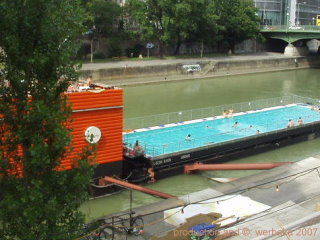 |
Well, the young lady, that you find in a bathtub in the city centre, while she at the same time is bestowed with a facial mask - she has solved the problem in her own way. A couple of hundred meters further on, one reaches the Donaukanal, a side-arm of the Danube. In times gone by there was a song about the "slanting meadow at the Donaukanal" being the Riviera of the Viennese. But the same goes here - today the water really isn't inviting any more. In Vienna there is a solution found, though: A bathing boat is anchored at the embankment and in its tow there is an open air water basin, so that one can get amusement and a cooling down "in the water on the water".
 |
Finally the Viennese are rather understanding. They have understood long ago, that it doesn't help, talking to the owners of dogs, when it is about not delivering the waste of the metabolism of their fourlegged sweethearts. That is why they now talk to the dogs themselves. Is that not utterly humane?
So, Vienna is different - there is not any further doubt possible, is there?
© Bernhard Kauntz, Wolvertem, Belgium 2013 |
Back to  or to the or to the  of of 
23.7.2013 by webmaster@werbeka.com
|















